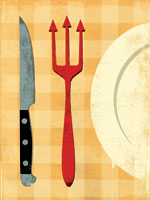I was scanning a menu at a restaurant with a friend last month when she declared she'd be eating light for lunch. "I was so bad last night," she groaned, referring to one of the fried egg rolls she'd eaten for dinner. "I definitely want to be good today." I knew exactly how she felt—I was trying to be "good" at lunch to balance out how "bad" I planned on being for dinner! But the more we talked about our food choices, the more I wondered: When did eating become such a moral judgment call?
Chomp on carrot sticks and you're a "saint," devour Death by Chocolate for dessert and you're a "sinner." Raw food is "cleansing" and conventionally grown berries are "dirty." If you have a not-so-healthy meal when you're trying to lose weight, you "cheated." And, of course, we all have our "guilty pleasures"—food so forbidden we're wracked with regret for eating it (butter on your movie popcorn, anyone?). Now that we know the value of eating organically, locally, and sustainably, our guilt is compounded: Even on a nutritious diet, we feel "naughty" if we choose the farm-raised salmon over the more expensive wild-caught one or buy potatoes that weren't dug up from a garden down the street.
Sure, guilt over what we eat is nothing new. But it seems we're harder on ourselves than ever before. Reflecting on how horrible I am for buying nonorganic apples affects me to my core.
Putting all this pressure on ourselves to eat perfectly starves the eating process of any pleasure. Gone is the ecstasy of relishing the tastes, the textures, the salty, the sweet. Whether it's a well-seasoned steak, a lobster dipped in butter, or a freshly cracked creme brulee, the appreciation of food is its own little heaven. The more judgmental we are about every bite, the less delicious it all tastes. And let's face it: Overthinking every single thing we put in our mouths can make us obsessive, leading to cravings and bingeing—the farthest thing from the "good" we set out for in the first place!
I finally saw the toll my moral eating was taking over a home-cooked meal with my husband and a friend last week. We served up what I thought was a healthy meal of grilled chicken and vegetables.
"Mmm, delicious," my friend said. "Where'd you get the squash?"
"The grocery store," I replied.
"I'm so bad like that sometimes, too," she confided. "There's no reason why we shouldn't be getting everything at the farmers' market."
I nodded, but inside I was seething. The meal was fresh, nutrient-rich, and with a little smoke from that grill, pretty dang tasty. How could this delicious food make me feel like a failure? I like to avoid hormones and pesticides as much as anyone else, but sometimes there is a good reason I can't make it to the farmers' market.
Living well, after all, is really all about balance. Sometimes I read The Week for a dose of serious news, sometimes I watch reality TV for a helping of "Hell no!" The way I see it, a little greasy takeout with a repeat of Jersey Shore can be good for my soul.
Chomp on carrot sticks and you're a "saint," devour Death by Chocolate for dessert and you're a "sinner." Raw food is "cleansing" and conventionally grown berries are "dirty." If you have a not-so-healthy meal when you're trying to lose weight, you "cheated." And, of course, we all have our "guilty pleasures"—food so forbidden we're wracked with regret for eating it (butter on your movie popcorn, anyone?). Now that we know the value of eating organically, locally, and sustainably, our guilt is compounded: Even on a nutritious diet, we feel "naughty" if we choose the farm-raised salmon over the more expensive wild-caught one or buy potatoes that weren't dug up from a garden down the street.
Sure, guilt over what we eat is nothing new. But it seems we're harder on ourselves than ever before. Reflecting on how horrible I am for buying nonorganic apples affects me to my core.
Putting all this pressure on ourselves to eat perfectly starves the eating process of any pleasure. Gone is the ecstasy of relishing the tastes, the textures, the salty, the sweet. Whether it's a well-seasoned steak, a lobster dipped in butter, or a freshly cracked creme brulee, the appreciation of food is its own little heaven. The more judgmental we are about every bite, the less delicious it all tastes. And let's face it: Overthinking every single thing we put in our mouths can make us obsessive, leading to cravings and bingeing—the farthest thing from the "good" we set out for in the first place!
I finally saw the toll my moral eating was taking over a home-cooked meal with my husband and a friend last week. We served up what I thought was a healthy meal of grilled chicken and vegetables.
"Mmm, delicious," my friend said. "Where'd you get the squash?"
"The grocery store," I replied.
"I'm so bad like that sometimes, too," she confided. "There's no reason why we shouldn't be getting everything at the farmers' market."
I nodded, but inside I was seething. The meal was fresh, nutrient-rich, and with a little smoke from that grill, pretty dang tasty. How could this delicious food make me feel like a failure? I like to avoid hormones and pesticides as much as anyone else, but sometimes there is a good reason I can't make it to the farmers' market.
Living well, after all, is really all about balance. Sometimes I read The Week for a dose of serious news, sometimes I watch reality TV for a helping of "Hell no!" The way I see it, a little greasy takeout with a repeat of Jersey Shore can be good for my soul.
 11:29 AM
11:29 AM
 ade nganthok
ade nganthok



